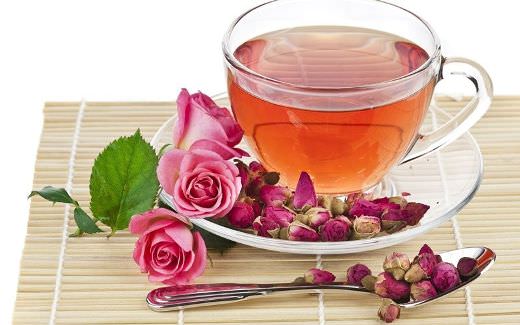Drinking rose water brings surprising health and skin benefits for its anti-inflammatory, antibacterial and antiseptic properties, as well as being an excellent source of vitamins (A, B, C, D and E) and flavonoids. Discover everything that hides rose water behind its particular fragrance and, above all, how to prepare it.
Rose water is much more than a cosmetic, and in fact, its origin goes back to ancient Persia (Iran). Its topical use (to apply to the skin or hair) and to spray (as a spray for its relaxing effect) are its most popular applications, but rose water has proved to be an excellent tonic for overall health, and can be taken for relieving numerous discomforts.
History of rose water
Its origins date back to ancient Persia, where it was used mainly for the production of beverages and flavorings, although in ancient India it was also applied to soften the skin and treat some skin diseases.
Subsequently, its use spread to other continents, mainly Europe, where it was used above all to make food, mostly sweets. In India and Arab countries, it is commonly used to make puddings and sweetened milks, although it is also added in the preparation of main dishes, as a substitute for wines and spirits.
After the arrival of rose water to Europe and America, it began to be used especially in the field of confectionery, where it was frequently added in the preparation of desserts until the 19th century, especially in France, where it was very frequent. It is use to make tartines, cakes and cookies.
Later, with the arrival of new essences to European and American kitchens, such as the essence of vanilla, orange blossoms and almonds, among other popular flavorings such as citrus zest, the use of rose water became less frequent in the field. gastronomic, and it lost popularity.
Benefits of drinking rose water
- It promotes hydration of the skin, hair and nails.
- Provide vitamin C, E and B complex.
- Prevents premature aging of the skin due to its antioxidant effect.
- Improves mood.
- Relieves stress and symptoms of depression.
- Reduce anxiety.
- Improves the digestive system.
- Avoid constipation.
- Improves breathing by its bronchodilator effect in colds and flu.
- It relieves coughing and works as a good remedy for sore throat.
- Reduces inflammation.
- Relieves headaches and mental tension.
- Reduces fluid retention in the body.
- Reduces signs of unsightly stretch marks.
- Reduces signs of fatigue.
- Reduce skin irritation.
- Prevents bladder infections.
- Relieves eye infections.
- Helps to fight bad breath or halitosis.
- Relieves inflammation of the gums.
Rose water benefits for skin health
Due to its antioxidant, anti-inflammatory, healing and astringent properties, rose water is a very effective and reliable product when used for cosmetic purposes or in natural beauty treatments.
Its benefits in the health of the skin are remarkable; among them are:
- Regenerate damaged skin
- Maintain elasticity in the skin
- Reduce the damage caused by sun exposure
- Reduce skin wear due to age
- Moisturize the skin (this is why the cosmetic industry uses this essence to create cream lotions and moisturizing sprays)
- Avoid the formation of premature wrinkles
- Reduce age spots
- Prevent new breakouts
- Prevent skin infections
- Treat acne and other scars.
The ideal method to apply this toner on our face is to distribute it with a cotton ball over the entire previously washed face and let it rest before using a moisturizing product before sleeping.
How to prepare rose water at home
Preparing rose water is very easy. We only need water (1 liter) and rose petals (500 grams).
- Put the petals, after cleaning, in a pan and add the water.
- Let stand for 10 minutes.
- Put on the fire and boil for 10 minutes.
- After this time, lower to simmer, cover the pan and leave another 5 minutes.
- Remove from the heat and let stand for at least one hour.
- Filter and let cool in the refrigerator.
Rose water infusion
- Put to heat water and when it starts to boil add a handful of rose petals.
- Leave to heat for 10 minutes.
- Remove and let stand for a few minutes.
- Filter before taking.
Side effects of rose water
In general, rose water is a very safe product for personal use, which does not trigger allergies. However, it is not advisable to consume this essence in excess or substitute medical treatments with it, as it can be counterproductive.
However, in the case of consumption, it is recommended that it be rose water made from distillation and diluted with drinking water so as not to consume a very strong or concentrated product. If applied to the face, it is preferable to do it at night, before sleeping.
Rose water is believed to be safe for pregnant and lactating women, but it is best to consult your doctor before administration, especially if you have a history of allergies to some plants.
